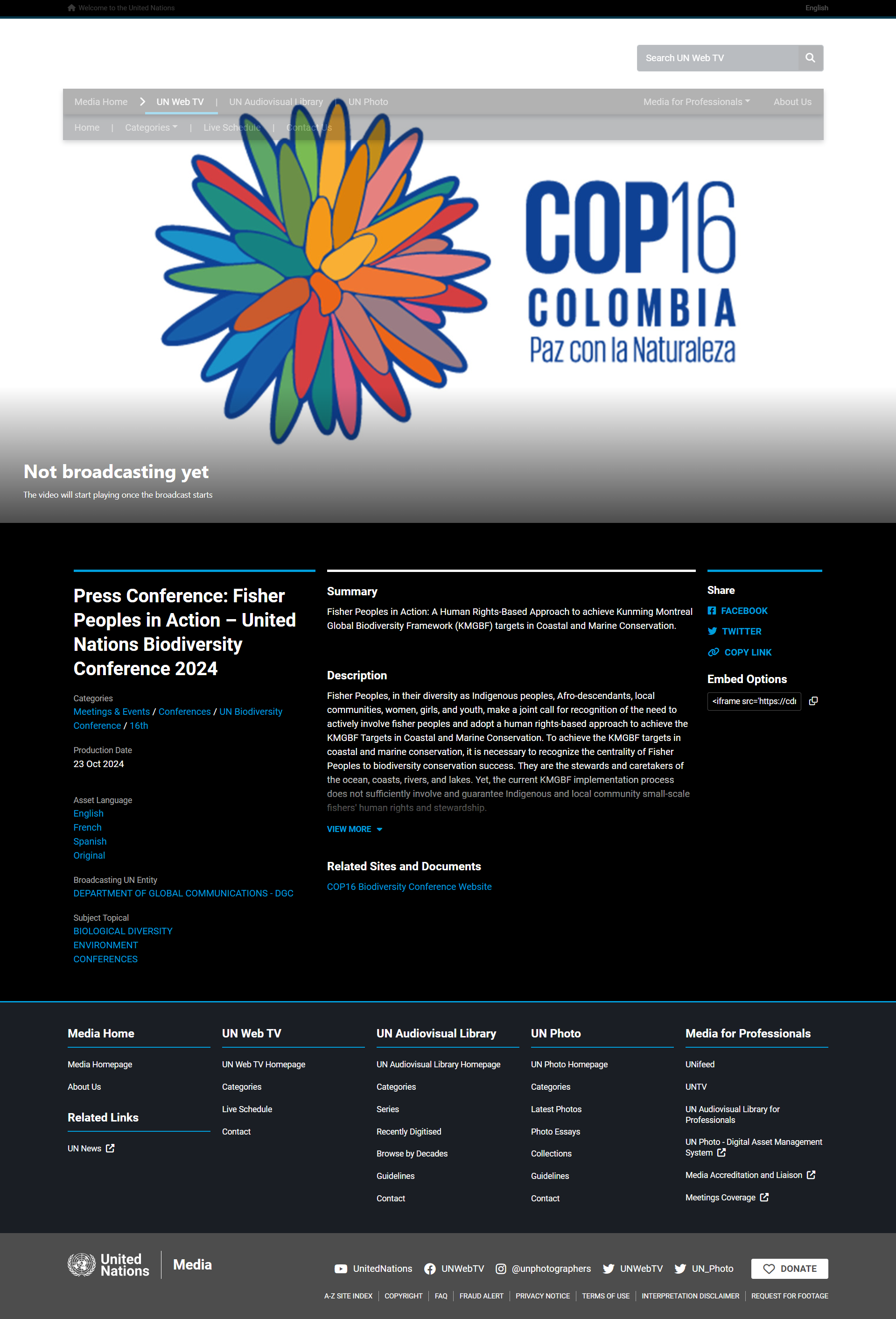
Water covers 70 percent of the Earth. Marine and freshwater environments sustain an abundance of life in its spectacular diversity. Through our history, small-scale fishing communities have interacted and depended on these living resources. A threat to aquatic environments is a danger to artisanal fishers.
Their protection and stewardship are essential to the communities and cultures they sustain. This relationship is a framework to manage conflicts and improve the quality of life and livelihood of small-scale fishers. It was recognized in the UN Convention on Biological Diversity.
Governments increasingly designate marine protected areas (MPAs) for conservation and management. This legal instrument does help but its implementation has raised serious concerns. Target-driven expansion of MPAs is fixated on quantitative goals. This has hit the rights, livelihoods and sustainable use practices of small-scale fishing communities. MPAs—created often in a non-consultative and non-participatory manner—have focused on regulating/restricting their fisheries, failing to recognize their sustainable livelihoods, culture and survival.
It is imperative that protection efforts are grounded in principles of sustainable use. That their processes are inclusive and recognize</b< traditional local systems of knowledge and governance, building upon them. Artisanal fishers must be the frontline of marine biodiversity conservation. There is an urgent need for systematic improvements on all such matters.
A range of ICSF’s initiatives highlight the social and political dimensions of conservation. The importance of livelihoods of poor and vulnerable communities, of their participation and consultation. The co-management of resources by fishing communities, based on a human rights approach to conservation.

Fisher Peoples in Action: A Human Rights-Based Approach to achieve Kunming Montreal Global Biodiversity Framework (KMGBF) targets in Coastal and Marine Conservation. Description: Fisher Peoples, in their diversity as Indigenous peoples, Afro-descendants, local communities, women, girls, and youth, make a joint call for recognition of the need to actively involve fisher peoples and adopt a human rights-based approach to achieve the KMGBF Targets in Coastal and Marine Conservation. To achieve the KMGBF targets in coastal and marine conservation, it is necessary to recognize the centrality of Fisher Peoples to biodiversity conservation success. They are the stewards and caretakers of the ocean, coasts, rivers, and lakes. Yet, the current KMGBF implementation process does not sufficiently involve and guarantee Indigenous and local community small-scale fishers’ human rights and stewardship. For more details, please visit: https://webtv.un.org/en/asset/k15/k15icg47f5
In preparation for COP10 of CBD, ICSF compiled all articles from Samudra Report on MPAs and highlight the problems with top-down planning and implementation of MPAs, while drawing attention to...
The workshop was meant to discuss five case studies on marine and coastal protected areas in India undertaken from a fishing community perspective. The deliberations at the workshop centered around...

This study on marine protected areas (MPAs) in India analyzes the legal and institutional framework for their establishment, and uses two case studies–the Gulf of Mannar National Park and Biosphere...
Based on detailed studies of three sites–the Peixe Lagoon National Park in Rio Grande do Sul, and the marine extractive reserves (MERs) of Mandira, São Paulo, and Corumbau, Bahia–the study...
This study discusses the social dimensions of MPAs in Tanzania, using the case of the Mafia Island Marine Park and the socioeconomic, political and cultural contexts within which Mafia people...
This study on marine protected areas (MPAs) in Mexico relies on a variety of data sources as well as the authors’ longstanding field experience, particularly in the Yucatan Peninsula, to...
This study analyzes five marine protected areas (MPAs) in South Africa, which span three of the country’s four coastal provinces, namely, the Langebaan Lagoon MPA, the Maputaland MPA, the St...
By taking an intense look at the concerns revolving around turtle conservation and the protection of the livelihoods of traditional fishing communities, this film offers some insights into the dilemmas...
This theme provides information on four binding instruments, four non-binding conference declarations and three plans of action. The instruments make specific reference to conservation and sustainable use of inland, marine...
This study analyzes the existing sea turtle conservation measures in Orissa and the implications of conservation approaches for the livelihoods of fisherfolk, particularly for traditional fishing communities and the women...
2024 United Nations Biodiversity Conference – SBI 5 / CBD COP 16 / CP-MOP 11 / NP-MOP 5 Text-based negotiations continued in multiple settings. Working Group II concluded the first...
The implementation of the Kunming-Montreal Global Biodiversity Framework must respect the rights, cultures and knowledge of Indigenous Peoples and local communities if we are to reach the goal of living...
Fisher Peoples in Action: A Human Rights-Based Approach to achieve Kunming Montreal Global Biodiversity Framework (KMGBF) targets in Coastal and Marine Conservation. Fisher Peoples, in their diversity as Indigenous peoples,...
2024 United Nations Biodiversity Conference – SBI 5 / CBD COP 16 / CP-MOP 11 / NP-MOP 5 – Daily report for 22 October 2024 Negotiations entered full speed as...
2024 United Nations Biodiversity Conference – SBI 5 / CBD COP 16 / CP-MOP 11 / NP-MOP 5 – Daily report for 21 October 2024 Following Sunday’s ceremony, opening and...
2024 United Nations Biodiversity Conference – SBI 5 / CBD COP 16 / CP-MOP 11 / NP-MOP 5 – Daily report for 18 October 2024 Delegates to the fifth meeting...
2024 United Nations Biodiversity Conference – SBI 5 / CBD COP 16 / CP-MOP 11 / NP-MOP 5 – Daily report for 17 October 2024 The fifth meeting of the...
2024 United Nations Biodiversity Conference – SBI 5 / CBD COP 16 / CP-MOP 11 / NP-MOP 5 – Daily report for 16 October 2024 The fifth meeting of the...
Our view in the South is that subsidies are doing great damage to African agriculture. On one hand, huge producer subsidies in Europe and the United States promote imports into...
Subsidiary Body on Implementation Fifth meeting Cali, 16–18 October 2024: Item 2 of the provisional agenda – Review of implementation of the Kunming-Montreal Global Biodiversity Framework, including means of implementation...